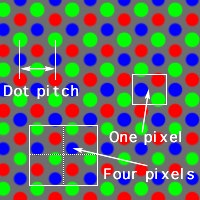
A smaller dot-pitch gets you a higher resolution on a given monitor, but
a smaller dot-pitch doesn't necessarily mean that the picture quality is
better. Some monitors will look better with a larger dot-pitch. The trick
is to match the dot-pitch with the pixels-per-inch that you're going to be
using most. If they're not multiples of the form x:1 (ideally 1:1) then
the monitor won't look as good. Sorry about the background.
Trinitron (and Mitsubishi's Diamondtron) monitors are different,
though. They have a series of lines and not dots. I took some super
close up pictures of a bunch of different monitors, including an LCD
monitor from a laptop, a really crappy non-trinitron monitor, a good
non-trinitron monitor, an old Apple 13"
trinitron, and a nice new sharp Diamondtron. I've not scanned in
all the photos yet, but bear with me.
I think this site was pretty useful too.
On Sun, 16 Dec 2001, Alan & Lucia Fuller wrote: > We're looking for a flat screen monitor. So what you're saying is that given > a choice between two - both 17" and one is a .27 dot pitch and the other one > is a .20 dot pitch, the .20 should have a better quality image. >With flat screen monitors, all bets are off. Flat screen monitors have a single red-green-blue set per pixel. Period. So, a 17" that has a .20 dot pitch will be able to display more pixles than one with a .27 dot pitch. Assuming that both 17" monitors are the same dimentions the .20 one will be able to display more stuff, but all that stuff will be smaller. A more useful way to think about it for flat screen monitors is the maximum resoluion. One that will do 1280x1024 will show more info than one that will only do 1024x768. If you have good eyes, that higher resolution, smaller dot pitch one will be beter for you. If you don't have good eyes, the lower resolution large dot pitch will be better.
The problem is that the only ways to change the resolution of a flat-screen monitor is to either try to fake the lower resolution by smearing the pixles onto more than one pixel each, which looks crappy, or to have black bars around the outside of the monitor, which doesn't get you anything.
For me, if they were the same price I'd get the smaller dot pitch higher resolution one, but I have good close vision. I wouldn't recomend that to my parents, as they tend to want all the fonts to be bigger so they can read them easily.